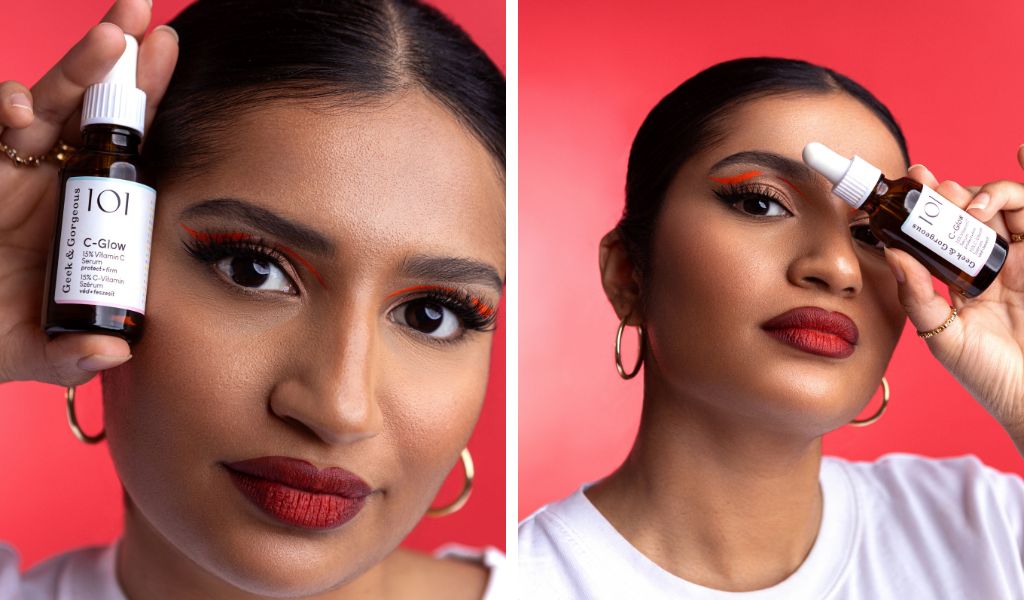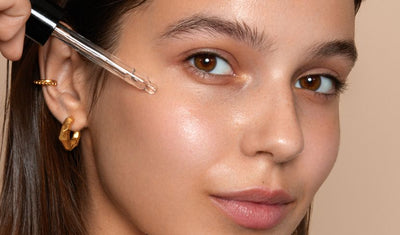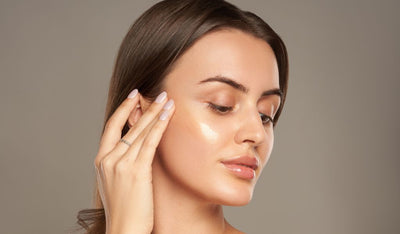You probably know vitamin C as a booster for your immune system. But the vitamin also has a lot to offer in skin care, because as an anti-aging ingredient, vitamin C has a protective effect and ensures a beautiful glow. Curious? We'll show you all the benefits here and how to best use vitamin C!
What is vitamin C and how does it affect the skin?
Vitamin C, also known as ascorbic acid, is an essential nutrient for our body that we must obtain through food. It is one of the water-soluble vitamins and you are sure to know it thanks to its strengthening effect on the immune system.
Citrus fruits, as well as vegetables such as peppers and spinach, contain particularly high levels of vitamin C. If you have a vitamin C deficiency, there are dietary supplements that can help rebalance your body's levels.
But vitamin C is not only a great boost for your immune system : it also supports the absorption of iron and helps build bones, teeth and connective tissue. At the same time, it has great antioxidant properties that help protect against damage caused by free radicals.

But you can also benefit from the great properties of vitamin C in skin care. It is ideal for caring for and protecting the skin. You can now find a large selection of different vitamin C products in different concentrations and forms on the market.
In skin care, a distinction is generally made between a pure form of vitamin C and a vitamin C derivative.
You can identify vitamin C in your products by the following terms:
- Ascorbic Acid (pure vitamin C): The best known and most studied form of vitamin C in skin care. Ascorbic acid is highly effective, but can also be very unstable and irritating to some skin types.
- Ascorbyl Glucoside (ascorbic acid and glucose): This combination is a more stable derivative that converts into ascorbic acid when it comes into contact with the skin. It is generally more tolerable than the pure form.
- Magnesium Ascorbyl Phosphate or Sodium Ascorbyl Phosphate (salt-like ester form): These forms are significantly more stable and better tolerated than ascorbic acid, but are also less effective.
- Ethyl Ascorbic Acid (water-soluble ester form): This variant penetrates easily into the skin and is a stable yet effective form of vitamin C.
- Ascorbyl Palmitate or Ascorbyl Tetraisopalmitate (fat-soluble vitamin C esters): These two forms are less potent than ascorbic acid, but are particularly stable. You will find them mainly in products that target the skin barrier.
5 benefits of vitamin C for the skin
Vitamin C is a highly effective ingredient in skin care, which primarily combats and prevents the first signs of skin aging. It stimulates collagen production and thus ensures more elasticity in the skin. The result is firmer and smoother skin.
At the same time, vitamin C has a great antioxidant effect and protects against free radicals and oxidative stress. Both are major factors in skin aging and can contribute to the formation of wrinkles and pigment spots.

However, vitamin C can also reduce existing pigment spots and other hyperpigmentation, such as acne scars. It gradually lightens these and makes them fade. Vitamin C is also said to be a great aid in the treatment of scars.
Ultimately, every skin type can benefit from vitamin C products. But the active ingredient is particularly ideal for oily skin types and those prone to blemishes, as it reduces annoying side effects such as enlarged pores and pimples. This makes the skin appear much more even.
Our product recommendations for Vitamin C
C-Glow by Geek & Gorgeous
12,90 €
with the code
-0%
Latest lowest price: 9,02 €
(Prices incl. VAT, plus shipping)

Facial Rejuvenating Vitamin C Powder - 100% L-Ascorbic Acid from MERME
54,00 €
with the code
-0%
Latest lowest price: 54,00 €
(Prices incl. VAT, plus shipping)

C15 Super Booster from Paula's Choice
15,90 €
with the code
-0%
Latest lowest price: 15,90 €
(Prices incl. VAT, plus shipping)

Vitamin C Daily Moisturizer by Super Facialist
Discover more vitamin C products here
The correct application of vitamin C
All skin types can use vitamin C, but it always depends on the individual formulation.
For example, dry skin types should either use a vitamin C serum that contains additional moisturizing ingredients such as hyaluronic acid. Alternatively, a second, rich serum can also balance the skin again.
If you have sensitive skin, you should be careful with vitamin C. It is important that you start using it slowly. If you are using a highly concentrated serum, start with once a week.

But other skin types should also Test vitamin C first. Be sure to do a patch test before using it for the first time. This will help you better assess your skin's reaction and check whether you can tolerate vitamin C.
Vitamin C is generally considered well tolerated, but may cause irritation, redness or an allergic reaction in some people.
This is how you proceed with the compatibility test (patch test):
- Apply a small amount of the product to an inconspicuous area, such as behind your ear.
- Follow the application instructions in the product description.
- After 24 hours, check the area for irritation.
Skin care routine with vitamin C
In what order should you use vitamin C with other products? Of course, it depends on whether you are using a highly concentrated serum or a moisturizer with a low vitamin C content.
A moisturizer can usually be applied daily and always last. Vitamin C products are ideally used in the morning, as this increases the effect of your sun protection.
So here are two examples of a morning skincare routine using a serum that contains 15% ascorbic acid. Remember, you should only follow this routine one to three times a week when you start your vitamin C treatment!
Morning routine for oily skin
Clean with water or optionally with a mild cleanser, such as Jelly Joker by Geek & Gorgeous
Balancing toner, such as calm tøday Liquid Balancer from Nø Cosmetics
Vitamin C serum, such as C-Glow by Geek & Gorgeous
Moisturizing toner, such as happy tøday 120h Liquid Hydrator
Light moisturizer, such as Hydration Station by Geek & Gorgeous
Sun protection, such as Yoghurt Sunscreen Gel for the Face SPF30 by KORRES
Lip care, such as Lip Balm SPF 50 from Paula's Choice
Morning routine for dry skin
Moisturizing toner, such as Comforting Toner from MÁDARA Cosmetics
Vitamin C serum, such as C-Glow by Geek & Gorgeous
Oil, such as Facial Balancing Elixir 100% Jojoba Oil from MERME
Rich moisturizer, such as strong tøday Hypersense Pink Power by Nø Cosmetics
Sun protection, such as Yoghurt Sunscreen Gel for the Face SPF30 by KORRES
Lip care, such as Lip Balm SPF 50 from Paula's Choice

3 tips for using vitamin C
Do you want to finally start using vitamin C and integrate it into your skin care routine from now on? Then consider these three tips!
- Shelf life: Vitamin C is an unstable active ingredient that quickly loses its effectiveness when exposed to too much light, air or heat. Therefore, some manufacturers recommend storing the serum or vitamin C cream in the refrigerator and using it up quickly.
- Use in the morning: Ideally, use a vitamin C serum in the morning so your skin is best protected from the environmental influences it is exposed to during the day.
- Combination with retinoids: You should never use vitamin C and retinol or retinal in the same routine. It is best for your skin if you use vitamin C in the morning and the retinoid product in the evening.
Combination with other active ingredients
Are you already using other active ingredients in your skin care routine and are unsure whether you can safely integrate vitamin C?
Here you can find more information about the active ingredient combinations:
Vitamin C and hyaluronic acid
Hyaluron and vitamin C combine perfectly. Hyaluronic acid is a mild active ingredient that provides a lot of moisture and is suitable for all skin types.
Vitamin C and Vitamin E
The two vitamins complement each other wonderfully thanks to their antioxidant properties. Vitamin E also smoothes the skin and increases moisture levels.
Vitamin C and retinoids
Retinol and retinal cannot be combined with vitamin C. At least not in the same routine.
Vitamin C products should ideally be used in the morning, whereas retinoids are best applied in the evening.
Vitamin C and niacinamide
Niacinamide has a similar brightening effect to the vitamin. At the same time, it soothes the skin and supports the protective barrier. The two active ingredients can be combined perfectly because they complement each other so well.
Vitamin C and BHA
Salicylic acid (BHA) has a peeling effect and makes the complexion more even. However, you should also be careful not to combine the two active ingredients in one routine. You should use salicylic acid in the evening.
Discover more skincare hereVitamin C: Our conclusion
In addition to its function in our body, vitamin C is also a highly effective ingredient in skin care. Vitamin C not only gives you a great anti-aging weapon, it also gives you a great glow.
As a beginner, you should definitely approach higher concentrations slowly and, above all, integrate ascorbic acid into your routine only slowly.
Are you looking for a vitamin C cream or serum? Then take a look at our product recommendations!
Artikel teilen:


































































